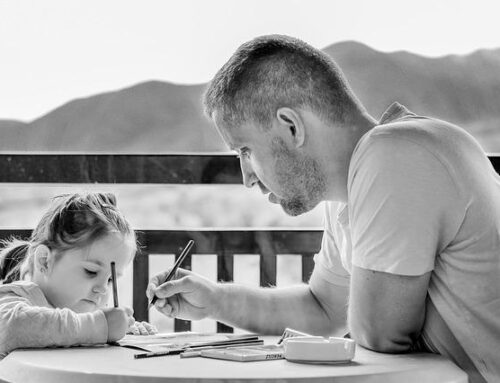Given our current situation (isolating due to COVID-19), many of us are spending a lot more time at home. Because of this, I need to ask you a few questions. How are you coping? Have you eaten all the ice cream in your house yet? How many other pairs of pants have you worn that are not your pajamas? Let’s be honest, who here has gone at least one day without brushing their teeth? These are very thought-provoking questions, and questions that you may not even want to admit to yourself nevertheless out loud to others. But they are all within the realm of normalcy when it comes to a situation that is beyond your scope of experience, and in response to a situation that has been placed upon you without your consent.
Over the past few weeks, I have heard the term “crisis” more times that I have ever heard in my life. But what is a crisis, really? According to the Oxford Dictionary, a crisis is “a time of intense difficulty, trouble, or danger. A time when a difficult or important decision must be made.” Mariam-Webster defines crisis as “the turning point for better or worse in an acute disease or fever. The decisive moment.”
After doing my intense Google research that took me all of a few minutes, I came to a conclusion. Both definitions have a common thread. They both identify that there is a decision to be made. They both represent that during an event that isn’t particularly pleasureful, there is a moment in time that allows for a choice. What could that choice be? Great question! The answer to that is very personal to everyone reading this blog.
Before I go into what that choice may be and how it is implemented, I would be remiss if I didn’t discuss the natural response that we are all feeling during this time. This is the grief response. We all go through a period of grief when we are put into situations that are out of our control, and that creates an immediate need for change. These situations in life are not usually ones that we choose, but ones that are thrust upon us. They can be anything from a diagnosis of a disease, the ending of a relationship, the loss of a job, finding out that there are no more double stuffed Oreos left (because someone else ate them, definitely not you), or any other situation where you felt that an undesirable choice was made for you. We are all in the same boat right here and right now in our current society. We are all living at a moment in time where the choice of going out places and meeting people is not an option.
So, let me quickly describe the stages of grief, and then I’ll move on to healthy coping strategies. The first stage of grief is denial. This is the time when things feel surreal. It feels like an alternate reality and that you are watching life as a movie as opposed to living it. It is a time where a sense of disconnect can be experienced. Yeah, you know what is happening logically, but you are unable to feel its impact just yet. You may also deny the magnitude of the situation. You tell yourself and others that you are fine, or that the situation is fine, and that everything is okay.
The second is bargaining. During this time, there is a dialog that happens internally. It can be used as an attempt to change the current state of affairs. If someone just broke up with you, you might try to convince yourself that you can still be good friends, justifying the text that you just sent. If you just learned of a medical diagnosis, you might swear that you will start to eat more healthy and work out more once you are healed. You try to make a trade. Bargaining is an attempt to get back to the previous state of familiarity and normalcy because you are struggling with the acceptance of what is now the new normal.
The third stage is anger. You may be angry at the new normal. You dislike it. You try to seek revenge on those who you perceive as having wronged you and put you in this position. In your current state of being relegated to staying at home to keep yourself and others safe and healthy, you might find yourself attempting to rebel. You might blame others and not take responsibility for how you are feeling at this time.
The fourth stage is despair. Despair can feel like depression. It can present itself in a similar way. You feel withdrawn, lack motivation, or sluggish. You may struggle to get out of bed, feel a loss of appetite, or an increased appetite. You may also find yourself irritable with others, edgy, and quick to frustration and temper. If people linger long enough in this stage of grief, depression may become a potential issue.
The fifth and last stage is acceptance. This is the stage where we would like to dwell more than any of the other stages. This is as the name suggests. It means that you have found a place where, despite not liking the situation or agreeing with it, you are accepting it for what it is. You are also able to recognize the power of your own choice in how you decide to deal with this change. You are taking more responsibility in your own life and making healthier decisions that feel more empowering. It is also important to note that these stages don’t occur in numerical order. You will bounce around from stage to stage and spend different amounts of time in each one. The goal, however, is to find yourself more in the acceptance stage longer.
In addition to the significant area of grief, there are secondary losses that have their own grief cycles. These are the other moments in your life that you will adjust to, and that are indirectly related to the major shift that you are experiencing. For instance, being at home may have impacted your income. This means that a secondary loss might be not being able to do something that you used to do routinely (such as going out for coffee, ordering a pizza because it’s Friday night, or struggle to pay your electric bill). Staying at home may also impact other routines in the house. Maybe your partner is now home because they can’t work, and the alone time you used to enjoy is hard to come by. Secondary losses can trigger stress that may lead to frustrations with family members who you can’t seem to get away from now. Keep these secondary losses in mind as you review where you are in the stages of grief from your primary loss.
There you have it! The Five Stages of Grief. This is the part where I connect the grief process with the definition of a crisis. I hope you are as excited as I am to see what I have to write next! The word crisis sounds scary, but it doesn’t have to be. The reason is this; crisis is defined as a moment of time when a decision is to be made. This means that you currently have some choices to make right now. This is an ongoing experience, and you have the power to make your life the way you want to make it within the context of the bigger picture. You still have time! You have time to decide how you are going to use the time that has been given to you. You have been placed into a situation that was not your choice. You will grieve, that is a given. Now you can choose what you will do next. Will you get out of bed? Will you put down that extra slice of pizza (so hard, I know)? Will you work out? Will you engage with your kids by playing a game? The choice is yours. This crisis is your moment of growth.
The following are some ways in which you may be able to cope in this time of crisis:
- Being that a crisis point is a time to make conscious choices, you identify how you choose to view this moment in your life. Change the way you talk about your current position. Instead of being “stuck” at home, be “safe” at home. It shifts the perception from away from the command to stay at home, to one that envelopes a choice. Changing a perception through word choice is empowering. “When we change the way we look at things, the things we look at change.” – Dr. Wayne Dyer.
- Limit the amount you watch the news. News programs are designed to keep you watching. Stress and negativity are addictive. Reducing your consumption of the news moderates stress levels. It is okay to be informed, but it is equally important not to become consumed.
- Create a schedule for your day. Keep yourself focused. This can help you get out of bed in the morning and add meaning to your experiences. This includes changing your clothes. It might be about time that you washed your pajama pants and gave them a break. Getting back into your old routine (e.g., getting dressed, brushing your teeth, showering etc.) re-establishes a sense of normalcy and control.
- Take the time that you would have spent commuting or getting ready for work to do something mindful and meaningful. Maybe do something that you haven’t been able to do because you previously didn’t have time for it.
- Be more present in your life. During your previous normal routine, which involved going from one task to another, it is easy to lose sight of living in the present moment. Practice being mindful in the here-and-now. Let’s be honest, where are you running to? Try a meditation practice or start a daily yoga routine.
- Despite the gym being closed, you can still do workouts at home. Many fitness streaming apps and online services are offering free and reduced-cost subscriptions. Also, research the gym where you are a member (if you are a member). Many fitness organizations are offering free online classes!
- Communicate with friends and/or family through online video conferences. Skype, Zoom, Google Hangouts, Facebook Messaging, etc. Many chat apps have video formats.
- Make healthier choices in your diet. Just because you are at home more, and the bag of chips is easy to access, that doesn’t mean it is the best option. Eat as if you would usually eat if you were away from the house for the day.
- Set boundaries around family time during the day. You may be around your family more since everyone is at home. This can lend itself to more bickering and arguments. If you are usually at work for a set time during the day, operate under a similar or modified schedule. If you and/or your partner are working from home, create workspaces that are not part of the common areas in the house. During work hours, try to keep to your own workspace, and attempt to communicate with them as you would normally do while at work.
- Take your life back. Do the mundane tasks that you used to do mindlessly (eating, chores, cooking, daily moments of caring for yourself), and do them mindfully. Slow things down. Chew your food while sitting down, instead of swallowing yesterday’s mac and cheese leftovers while standing by the kitchen sink. Enjoy the hot shower instead of using that time to worry or stress over other things. Live in the moment more.
- If you are still struggling with the transitions to your new normal, call The Center for Trauma, Stress, and Anxiety at (443) 567-7037 to make an appointment.





Leave A Comment